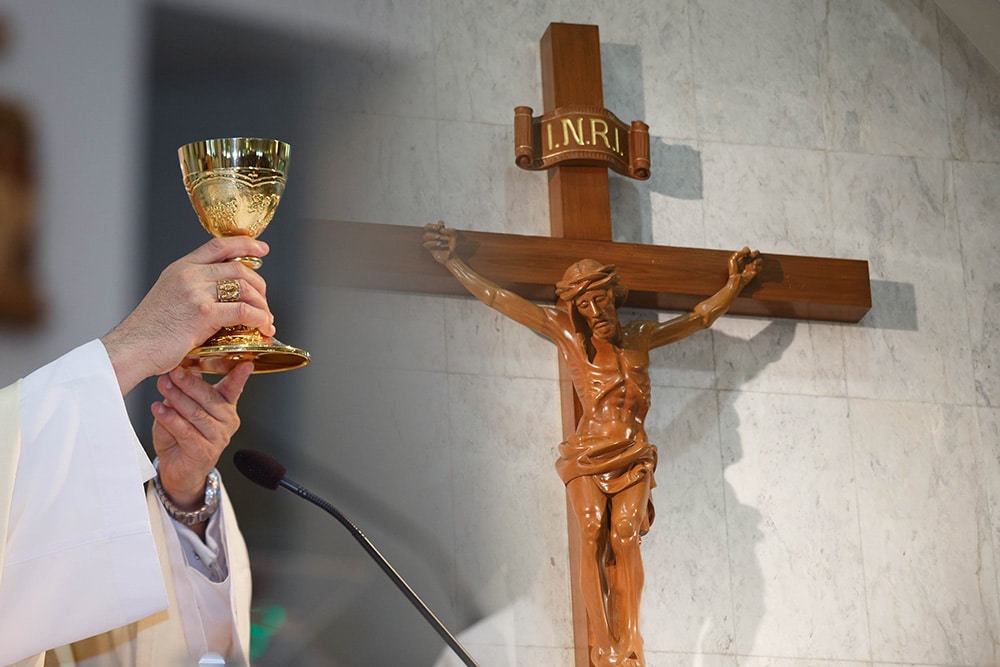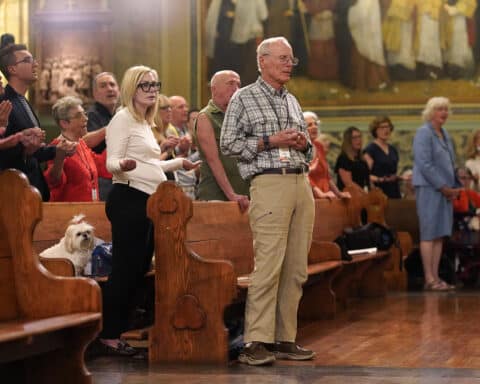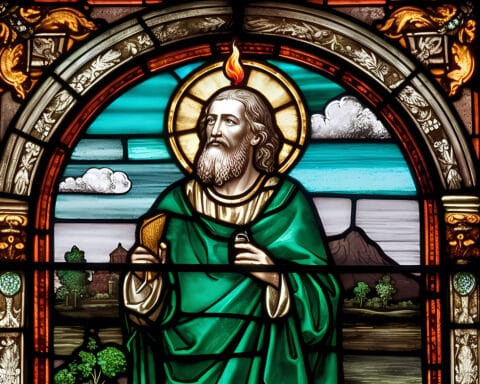
— Armel Audet, via email
Answer: It is certainly attested that Christ’s sacrifice was the perfect sacrifice, once and for all. The Letter to the Hebrews says: “But [Christ] offered one sacrifice for sins, and took his seat forever at the right hand of God …. For by one offering he has made perfect forever those who are being consecrated” (10:12-13). Hence the Mass is not a re-sacrificing of Christ. Rather, the Mass makes present to us the once-and-for-all and perfect sacrifice of Christ on the cross for our salvation. The Crucifixion reaches across time and is made present to us and bestows its graces on us.
However, make note of this: The sacrifice of Christ was a sacrifice of the whole Christ in terms of his body. St. Paul says, “Now you are Christ’s body, and individually parts of it” (1 Cor 12:27). Hence we, as members of the Body of Christ, are part of the sacrifice he offered. Christ offered his whole body — head and members together — to the Father for our salvation. Scripture says, “For this reason, when he came into the world, he said: ‘Sacrifice and offering you did not desire, but a body you prepared for me'” (Heb 10:5) Thus mystically and in a way that stretches across time, we are part of his sacrifice, since we are part of the very body he offered.
This is also what St. Paul means when he writes, “Now I rejoice in my sufferings for your sake, and in my flesh I am filling up what is lacking in the afflictions of Christ on behalf of his body, which is the church” (Col 1:24). Nothing, of course, is intrinsically lacking in Christ’s sufferings. However, the small role we play as a member of his body, joining our share in suffering to his, remains to be supplied from across time.
So when the priest prays that “my sacrifice and yours may be acceptable,” he is referring to our small share in the once-and-for-all and perfect sacrifice. The Mass, and the sacrifice of Calvary it makes present, is the work of the whole Christ — head and members together.
Peter vs. Paul
Question: In Galatians we read of a disagreement between Peter and Paul about the importance of circumcision. Peter lost. Does it not rise to a level of importance enough for Peter to not use his status as head of the Church?
— James Jeson, Milwaukee
Answer: The dispute was not over circumcision, but over favoritism Paul perceived in Peter toward Jewish Christians. And it is not clear that Peter lost. It is clear that Paul was unhappy about Peter’s actions in sitting among Jewish Christians and not equally among Gentile Christians. Why Peter did this is not clear. To our modern sensibilities it seems to be discrimination, but there may have been a prudential reason for Peter to have done this that is not disclosed to us. The only point here is not to reflexively conclude Peter was wrong and Paul was right.
But let’s assume that Peter was acting inappropriately. The Church does not teach that any pope lives a sinless life. Popes sin and make errors in judgment about how best to handle situations. It is certain, however, that Peter taught rightly that Gentile Christians should be respected and not be required to adopt all manner of Jewish cultural practices (cf. Acts 15:7-11). It is to the teachings of the pope that we first look in terms of authority. And even in terms of his teachings, not all that he says or teaches rise to the level of infallible dogma. Peter taught rightly even if he struggled to live the teaching perfectly.
In terms of his headship, Peter and all subsequent popes are due a general respect. However, unhealthy deference is to be avoided in relationships with superiors. There are simply times when we must air our differences and speak to superiors when we think they are acting wrongly.
In our own times, it is clear that many have seen fit to question certain actions and opinions of the current pope. Excluding excessive or needlessly harsh criticism, it is probably a healthy thing that Catholics are rediscovering their role in holding all their clergy accountable.
Msgr. Charles Pope is the pastor of Holy Comforter-St. Cyprian in Washington, D.C., and writes for the Archdiocese of Washington, D.C. at blog.adw.org. Send questions to msgrpope@osv.com.





